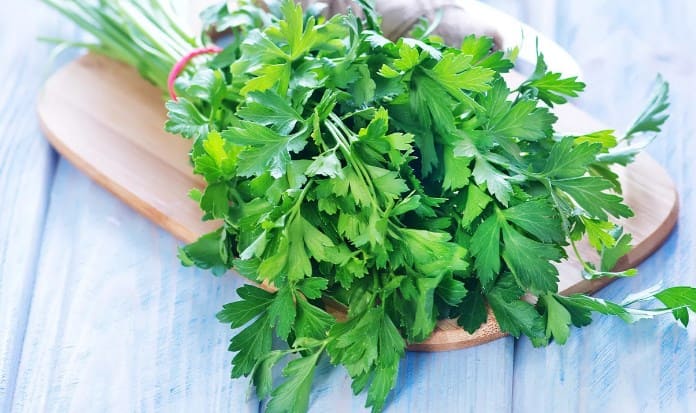Parsley is a green plant with a spicy and rich aroma. Its most common use is in cooking, but its beneficial properties and content of a huge number of useful components make it suitable for medical purposes to improve the body’s health. Parsley is adapted to different climatic conditions and can grow even at home. In ancient Greece, the spicy herb was considered a sacred plant because of its unique medicinal properties. Modern experts have made recommendations for eating parsley and identified contraindications.
Nutritional value of parsley
The caloric content of parsley per 100 g is only 47 kcal:
- Proteins – 3.7 g.
- Fats – 0.4 g.
- Carbohydrates – 7.6 g.
Vitamin composition of parsley
Vitamins contained in parsley are active antioxidants that remove free radicals from the body. They protect the immune system, cells, and tissues of the body, and promote their regeneration and active renewal.
Parsley contains the most ascorbic acid – vitamin C. It strengthens blood vessels and nervous system, and endocrine glands.
Folic acid – vitamin B9, actively participates in hematopoiesis and normalizes the liver and gastrointestinal tract. Thanks to folic acid, the balance of excitation and inhibition processes in the human nervous system is established.
Nicotinic acid – vitamin PP, is responsible for the stimulation of oxidative and reductive processes, and the production of gastric juice.
Tocopherol – vitamin E, is the main antioxidant, used to prevent aging, and restore capillaries.
Vitamin K – coordinates calcium metabolism, and normalizes blood clotting.
Vitamin B2 – riboflavin, is responsible for the condition of the epidermis and vision, maintaining the nervous system in optimal condition, and preventing nervous breakdowns.
Useful properties of parsley
First of all, parsley is used in medicine. Thanks to its essential oil, this plant becomes an excellent expectorant for colds, as well as a good antiseptic. The seeds and herbs are used to treat diseases.
Traditional medicine recommends parsley in the form of decoctions and infusions for the treatment of bronchitis and inflammatory processes, and as a preventive folk remedy. Useful juice of the green is used for heart diseases and to lower blood sugar. Therefore, parsley is a real salvation for diabetics.
This culinary spice is also used as a diuretic. For this purpose, a decoction of parsley is used. The same decoction is also a medicine for inflammatory processes of the prostate gland, kidney and ureteral stones, and menstrual disorders. Parsley perfectly cleanses the body, ridding it of toxins and extra pounds.
It also relieves irritation after insect bites, especially from bees (just crush a fresh bunch of herbs and anoint the bite). And its use as a remedy for bad breath can even eliminate the smell of garlic.
Useful properties of parsley in the fight against weakened vision, its combination with carrot juice gives a tangible result after a month of use.
Due to its beneficial properties, parsley is used in cosmetology as the main component of whitening masks. Its composition can help solve the problem of freckles on the face. Using a decoction of the herb daily not only whitens the skin but also makes it younger and gives it a healthy glow, as well as tightens it.
It is used in cooking as the main seasoning for meat and fish dishes, as well as in salads. Dried or fresh, culinary experts all over the world create unique flavor combinations in dishes. It is also used very often to decorate dishes and add freshness and originality to them.
Contraindications to the use of parsley
- Diseases in which parsley should not be consumed in any form:
- Cystitis.
- Urolithiasis.
- Diseases of the bladder.
- Inflammatory processes in the kidneys.
- Predisposition to allergies (parsley consumed in excessive amounts can exacerbate allergies or cause a profuse skin rash).
- Gout.



